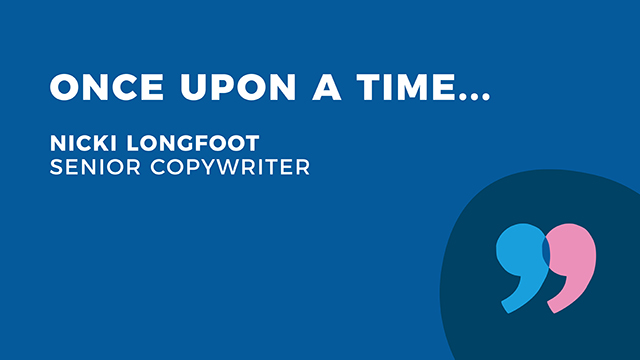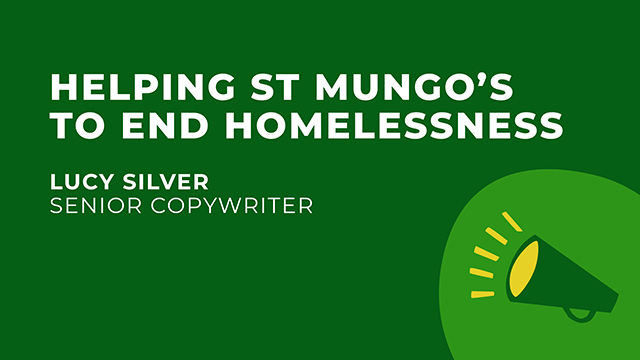A better story to tell: inclusive writing and ethical storytelling
 (3)-4uqayhw52q8w.png)
Senior Copywriter Lucy Silver shares why inclusive language and ethical storytelling are essential to moving our sector forward.
As fundraisers, we’re trading in one of the most precious and underused resources in the world: human empathy.
Every interview I do as a writer at Open is both eye-opening and humbling. In any given week, I could be speaking to researchers who can see the end to devastating diseases on the horizon. To parents who have lost children, but found the most compassionate care in children’s hospices. To leaders of emergency responses, delivering critical aid in unimaginably dangerous circumstances.
Each one of these stories is shared with us in trust. And after these interviews, the same questions arise: how can I help our audiences to feel as connected to these stories as I do? And most importantly, how can I convince them to fund more of this work?
Last year, I took part in a course run by inclusive and accessible communication educator Ettie Bailey-King.
Bold Type: become an inclusive and accessible communicator is a 12-week programme that covers a wealth of topics, from anti-racist language to accessibility, helping you communicate in a more inclusive and accessible way.
From what I learned, here are some ways we can work with our charity partners to tell stories better and move forward as a sector.
Defining our terms: what do we mean by inclusive language?
Ironically, the inclusive language space can quickly feel jargony, confusing and inaccessible. But it doesn’t have to be. For the purposes of our fundraising work, we can break it down into two main areas. First, language that is respectful of the people whose stories we’re sharing, and second, language that is clear and accessible to our audiences.
Inclusive language is foundational to more ethical storytelling in fundraising. They are not one and the same, but it’s the place to start. And it’s the place to meet your supporters, and bring them along with you.
Learn these inclusive language principles and use them to analyse writing
If you read no further, here are the key principles of writing inclusively that we’re adopting as an agency, from Ettie’s course, to help us all write more effectively.
If something feels ‘off’ about a piece of writing, ask yourself the following:
- Is it specific?
- Is it accurate?
- Is it supported by people most affected by the issue?
- Is it clear?
- Is the impact of what’s being said positive?
These simple questions help us all to avoid generalisations, while making sure we’re communicating effectively and giving ourselves the best chance to raise as much money as possible.
“Inclusive language isn’t about restriction – it’s about precision, humanity and respect. It’s about telling stories better.”
Content collection is everything
You can’t tell a new story with the same content. And as creatives, we can only work within the parameters of the material we’re given.
Whether you’re charity or agency side, we should be working together to find ways to get the best stories. We owe it to the people and causes we support to gather richer stories that show people in the round, not defined by problems or circumstances. And to take photographs that give greater context to people as individuals.
Agencies and clients need to go on this journey together
So many of our charity partners are working out how to use more inclusive language and be more ethical storytellers. So it’s vital that we have an agency point of view on what we mean by inclusive language, and why it matters.
We’re in the privileged position of having insight into many different approaches, from big NGOs to small charities. I think this cross-pollination of learning can help everyone level-up. This learning goes both ways; we welcome healthy challenges from our colleagues and clients, so that we can figure out the right thing to do together. We appreciate its emotive subject matter, and learning to feedback in a way that leads to people feeling ‘called in’ rather than ‘called out’ is central to this.
Long-term change needs long-term planning
If you’re committed to long-term change, through more ethical storytelling, then plan for it.
A single direct mail pack won’t cause a cultural shift overnight, as much as we’d like them to. And we must take our supporters with us, especially in what is such a tough fundraising environment. Retention materials, like newsletters and long-form emails, can be great places to test out and develop your own inclusive language and ethical storytelling principles.
Inclusive language and great fundraising results aren’t mutually exclusive
It would be naïve of us to not acknowledge the tension between more ethical storytelling and traditional fundraising methods.
The sector is all too familiar with tired tropes of supporters as superheroes, helping anonymous people in dire situations, without any agency or context.
But there are better stories to tell. Open and our clients have seen significant success, from supporter magazines to direct mail appeals, that have taken on more principles of ethical storytelling and still surpassed all targets.
We’ve done this through building trust and transparency, and giving platforms to people most affected by the situations we’re fundraising around.
Always keep your fundraising asks tangible, clear and jargon free
The quickest way to turn someone off your cause is to make them suspicious of where their money is going.
Often, we see that the tangibility of fundraising asks is the first thing that falls down in testing of inclusive language, because they are the places where the power dynamic between charities and the people they work with and support are most apparent.
But if work is life-saving, let your supporters know. Just be accurate, specific and clear while you’re doing it. And make sure you credit the partners and communities who are leading the work.
So, in conclusion…
Contrary to what the ‘you can’t say anything anymore’ brigade might claim, inclusive language isn’t about restriction – it’s about precision, humanity and respect. It’s about telling stories better. Being more accurate, not less bold. More empathetic, not less compelling.
There are better stories to tell, and we owe it to our supporters and the people we work to serve to find these stories and share them truthfully.
If you'd like to share compelling stories that grow your fundraising, talk to us today.

